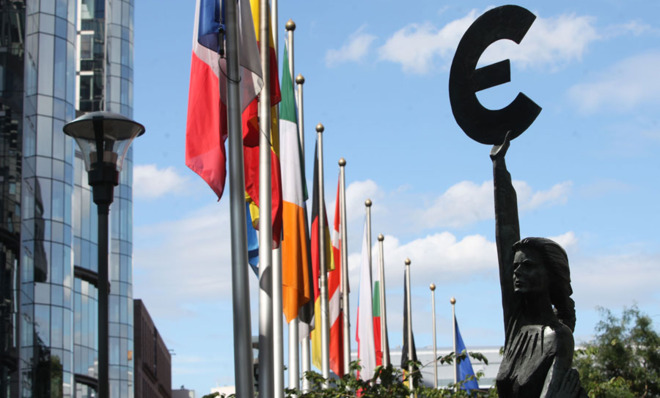What's wrong with Europe’s economy?
Four smart takes on the sputtering eurozone

A free daily email with the biggest news stories of the day – and the best features from TheWeek.com
You are now subscribed
Your newsletter sign-up was successful
The eurozone is at a standstill, said Bloomberg View in an editorial. Six years after the global recession, Europe's economic output remains flat — stuck at 2.4 percent below its pre-crisis peak. Meanwhile, "all three of the euro area's biggest economies — Germany, France, and Italy — are failing." Germany's economy actually shrank in the second quarter, while Italy's contracted for the second quarter in a row. Although "patience is often a virtue in central banking," the eurozone is also running dangerously "close to outright deflation." What the region needs is "quantitative easing of the kind applied by the U.S. Federal Reserve and the Bank of England," but the European Central Bank "is nervous because outright QE faces political and legal obstacles."
But even that won't be enough, said The New York Times in an editorial. If Europe hopes to save its economy, its leaders will need to rethink "the misguided policies" that they "stubbornly insist on pursuing." Germany's economic contraction should be a wake-up call, given that it has pushed the EU's policy "that governments reduce their deficits by cutting spending and raising taxes." It's clearer now than ever that such tactics "are exactly the wrong medicine." Following in other central banks' footsteps by buying bonds to lower interest rates and encourage lending is a great first step. But "fiscal policy must also be rethought and reworked." Instead of demanding that member nations reduce their deficits, the EU should give those governments "more flexibility." Now is the time to take advantage of low interest rates and "increase spending to kick-start their economies." Only after "the laggards get going again" should EU leaders push for tougher reforms.
"Throwing money at the problem" won't resolve the crisis, said Cyrus Sanati at Fortune. Japan tried that, and the country has been "in a slow and painful decline" for more than two decades. What Europe truly needs "is some real private investment, not more financial engineering." One way to attract investors would be for Europe to reduce capital gains taxes or abolish them altogether — at least temporarily. But that "would require harmonization of investment and banking laws across the continent, something that the EU has been dragging its feet on for several years."
The Week
Escape your echo chamber. Get the facts behind the news, plus analysis from multiple perspectives.

Sign up for The Week's Free Newsletters
From our morning news briefing to a weekly Good News Newsletter, get the best of The Week delivered directly to your inbox.
From our morning news briefing to a weekly Good News Newsletter, get the best of The Week delivered directly to your inbox.
Is Russia to blame? asked Vauhini Vara at The New Yorker. Probably not. In late July, the EU enacted broad sanctions against Russia in response to its "annexing the Ukrainian region of Crimea." Russia retaliated "by banning imports of beef, pork, fish, fruit, vegetables, and dairy products from the EU." But the political strife "happened too late to have any effect on Europe's second-quarter statistics," and "Russia's economy is far more dependent on trade with Europe" than vice versa. The truth is, Europe's leaders "recognize that the most important factors" behind the anemic recovery "are far deeper than any travel bans on oligarchs." Yes, "there are plenty of villains on this globe," but the EU's economic wounds are mostly self-inflicted.
A free daily email with the biggest news stories of the day – and the best features from TheWeek.com
Sergio Hernandez is business editor of The Week's print edition. He has previously worked for The Daily, ProPublica, the Village Voice, and Gawker.
-
 Local elections 2026: where are they and who is expected to win?
Local elections 2026: where are they and who is expected to win?The Explainer Labour is braced for heavy losses and U-turn on postponing some council elections hasn’t helped the party’s prospects
-
 6 of the world’s most accessible destinations
6 of the world’s most accessible destinationsThe Week Recommends Experience all of Berlin, Singapore and Sydney
-
 How the FCC’s ‘equal time’ rule works
How the FCC’s ‘equal time’ rule worksIn the Spotlight The law is at the heart of the Colbert-CBS conflict